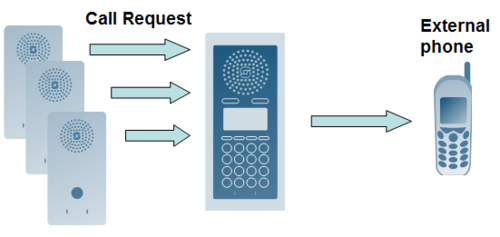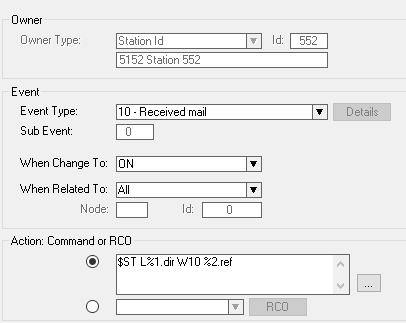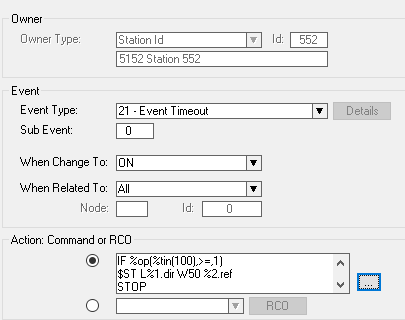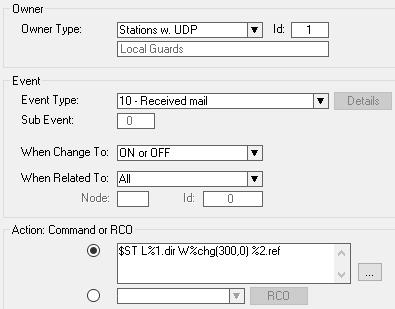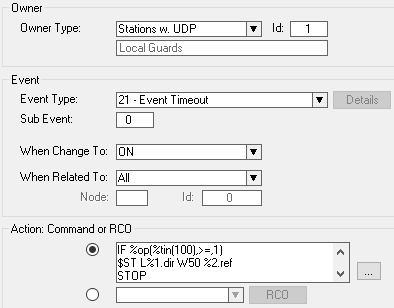Difference between revisions of "Forwarding of Call Request to external telephone"
From Zenitel Wiki
| (68 intermediate revisions by 4 users not shown) | |||
| Line 1: | Line 1: | ||
| − | {{ | + | {{AI}} |
| − | * '''Manual | + | [[File:ForwdCallReq.PNG|thumb|right|500px|Forwarding of Call Request to external telephone]] |
| + | This article describes how a [[ Call Request]] can be forwarded to an external telephone via a SIP Gateway. Two types of call forwarding are described: | ||
| + | * '''Manual Call Forwarding:''' The Call Forwarding is switched on and off by the operator by dialling a code or pressing a DAK key. | ||
* '''Automatic Call Forwarding''': If the Call Request is not answered within a programmable time, the calling station is connected to the telephone | * '''Automatic Call Forwarding''': If the Call Request is not answered within a programmable time, the calling station is connected to the telephone | ||
You can choose to use both types of forwarding, or only one of them. | You can choose to use both types of forwarding, or only one of them. | ||
| − | The call to the telephone will be activated only if there is a free telephone line. If all available lines are busy, the system will retry every 5 seconds until a line is free. | + | The call to the telephone will be activated only if there is a free telephone line. If all available lines are busy, the system will retry every 5 seconds until a line is free. If there are several Call Requests at the same time, they will be queued in the ICX-AlphaCom and handled one by one. The macro [[%tin|%tin (Trunk In Use)]] is used to check if there are any free lines. |
| − | There will be no redial if the telephone subscriber is busy. Also | + | There will be no redial if the telephone subscriber is busy. Also this article does not describe any option for dialing of alternative telephone numbers. |
| − | + | The SIP Gateway can for instance be [[Configuration guide for AudioCodes MP114/118, v5.4 and higher|AudioCodes MP114/118]] for analogue phonelines or [[Configuration guide for Mobile VoIP|MV-370]] for GSM network. The SIP gateways should be configured as described in the relevant AlphaWiki articles. | |
| − | |||
| + | See also [[Calling multiple external telephone numbers in sequence]] | ||
| − | [[Category: | + | |
| − | [[Category: Applications]] | + | == Software requirement == |
| + | * AlphaCom: 11.2.3.3 or newer. | ||
| + | * ICX-AlphaCom: any | ||
| + | |||
| + | == Manual Call Forwarding == | ||
| + | The Call Forwarding is turned on and off from the Queuing Station by forwarding the Call Request to a dummy station. The dummy number can be any station directory number in the exchange that is not in use. In this article 5152 on physical 552 is used as an example. | ||
| + | *'''Call Forwarding On''': Dial 7870 + Dummy Number (e.g. dial 7870 + 5152, or press a DAK key with the programming: I 7870 I 5152). | ||
| + | *'''Call Forwarding Off''': Dial 70 | ||
| + | |||
| + | In AlphaPro, [[Exchange_%26_System_%28AlphaPro%29#Events|Exchange & System -> Events]], press '''Insert''' to add a new event. | ||
| + | |||
| + | '''Event 1:''' | ||
| + | Start a 1 second timer when the dummy station receives a call request. | ||
| + | [[File:Application4a.png|500px|left|thumb|]] | ||
| + | <br style="clear:both;" /> | ||
| + | |||
| + | {{Code2| | ||
| + | $ST L%1.dir W10 %2.ref | ||
| + | }} | ||
| + | |||
| + | '''Event 2:''' | ||
| + | When the timer expires, and if there is a free phone line, the calling station will be connected to the SIP gateway (i.e. dial "0") and the phone number 12345678 will be dialed. | ||
| + | |||
| + | If there are no free lines the timer is restarted, and a new attempt will be made 5 seconds later. | ||
| + | [[File:Application4b.png|500px|left|thumb]] | ||
| + | <br style="clear:both;" /> | ||
| + | |||
| + | {{Code2| | ||
| + | [[%tin|IF %op(%tin(100),>=,1)]] ''(If the line is already in use on SIP Trunk node 100...)'' | ||
| + | [[SET TIMER|$ST L%1.dir W50 %2.ref]] ''(...then try again in 5 seconds by restarting the timer)'' | ||
| + | STOP | ||
| + | ENDIF ''(If the line is free...)'' | ||
| + | [[PLAY DAK|$PD %2.ref "0W12345678"]] ''(...dial 0, then 1 sec pause, then dial 12345678)'' | ||
| + | [[CANCEL MAIL|$CANM %2.ref L%1.dir]] ''(Delete the call request from the dummy station)'' | ||
| + | }} | ||
| + | <br> | ||
| + | |||
| + | About the expression "'''IF %op(%tin(100),>=,1)'''": | ||
| + | * 100 = the node number of the SIP Trunk. Change as required. | ||
| + | * 1 = There is one phone line connected to the SIP Gateway. If you are using MP114/118 with multiple lines connected, you need to change this number accordingly. | ||
| + | |||
| + | |||
| + | In the expression "'''$PD %2.ref "0W12345678"'''" substitute 12345678 with the wanted phone number. | ||
| + | |||
| + | == Automatic Call Forwarding == | ||
| + | |||
| + | The programming below will forward the calling station to the external telephone if the call request is not answered within 30 seconds. The time can of course be adjusted to suit your requirements. | ||
| + | |||
| + | |||
| + | In AlphaPro, [[Exchange_%26_System_%28AlphaPro%29#Events|Exchange & System -> Events]], press '''Insert''' to add a new event. | ||
| + | |||
| + | '''Event 1:''' | ||
| + | When a call request is received at the queuing station, a 30 sec timer is started. If the call request is deleted (i.e. the call request is answered), the timer is stopped: | ||
| + | [[File:Application4c.png|500px|left|thumb]] | ||
| + | <br style="clear:both;" /> | ||
| + | |||
| + | {{Code2| | ||
| + | $ST L%1.dir W%chg(300,0) %2.ref | ||
| + | }} | ||
| + | |||
| + | In the expression "'''$ST L%1.dir W%chg(300,0) %2.ref '''" 300 means 30,0 seconds. You can change this parameter if you want to use a different time. | ||
| + | |||
| + | |||
| + | '''Event 2:''' | ||
| + | When the timer expires, and there is a free line on the SIP Gateway, the calling station is connected to the SIP gateway. Else the timer is restarted and a new attempt is made 5 seconds later: | ||
| + | [[File:Application4d.png|500px|left|thumb]] | ||
| + | <br style="clear:both;" /> | ||
| + | |||
| + | {{Code2| | ||
| + | [[%tin|IF %op(%tin(100),>=,1)]] ''(If the line is already in use on SIP Trunk node 100...)'' | ||
| + | [[SET TIMER|$ST L%1.dir W50 %2.ref]] ''(...then try again in 5 seconds by restarting the timer)'' | ||
| + | STOP | ||
| + | ENDIF ''(If the line is free...)'' | ||
| + | [[PLAY DAK|$PD %2.ref "0W12345678"]] ''(...dial 0, then 1 sec pause, then dial 12345678)'' | ||
| + | [[CANCEL MAIL|$CANM %2.ref L%1.dir]] ''(Optional: Delete the call request from the queing station)'' | ||
| + | }} | ||
| + | |||
| + | |||
| + | |||
| + | About the expression "'''IF %op(%tin(100),>=,1)'''": | ||
| + | * 100 = the node number of the SIP Trunk. | ||
| + | * 1 = There is one phone line connected to the SIP Gateway. If you are using MP114/118 with multiple lines connected, you need to change this number accordingly. | ||
| + | |||
| + | |||
| + | In the expression "'''$PD %2.ref "0W12345678"'''" substitute 12345678 with the wanted phone number. | ||
| + | |||
| + | == Related articles == | ||
| + | * [[Calling multiple external telephone numbers in sequence]] | ||
| + | |||
| + | [[Category: AlphaCom Applications]] | ||
| + | [[Category: ICX-AlphaCom Applications]] | ||
| + | [[Category:Control Room Applications]] | ||
| + | [[Category: ICX-AlphaCom - SIP Integration]] | ||
Latest revision as of 15:12, 30 October 2024
This article describes how a Call Request can be forwarded to an external telephone via a SIP Gateway. Two types of call forwarding are described:
- Manual Call Forwarding: The Call Forwarding is switched on and off by the operator by dialling a code or pressing a DAK key.
- Automatic Call Forwarding: If the Call Request is not answered within a programmable time, the calling station is connected to the telephone
You can choose to use both types of forwarding, or only one of them.
The call to the telephone will be activated only if there is a free telephone line. If all available lines are busy, the system will retry every 5 seconds until a line is free. If there are several Call Requests at the same time, they will be queued in the ICX-AlphaCom and handled one by one. The macro %tin (Trunk In Use) is used to check if there are any free lines.
There will be no redial if the telephone subscriber is busy. Also this article does not describe any option for dialing of alternative telephone numbers.
The SIP Gateway can for instance be AudioCodes MP114/118 for analogue phonelines or MV-370 for GSM network. The SIP gateways should be configured as described in the relevant AlphaWiki articles.
See also Calling multiple external telephone numbers in sequence
Contents
Software requirement
- AlphaCom: 11.2.3.3 or newer.
- ICX-AlphaCom: any
Manual Call Forwarding
The Call Forwarding is turned on and off from the Queuing Station by forwarding the Call Request to a dummy station. The dummy number can be any station directory number in the exchange that is not in use. In this article 5152 on physical 552 is used as an example.
- Call Forwarding On: Dial 7870 + Dummy Number (e.g. dial 7870 + 5152, or press a DAK key with the programming: I 7870 I 5152).
- Call Forwarding Off: Dial 70
In AlphaPro, Exchange & System -> Events, press Insert to add a new event.
Event 1: Start a 1 second timer when the dummy station receives a call request.
Action commands:
$ST L%1.dir W10 %2.ref
Event 2: When the timer expires, and if there is a free phone line, the calling station will be connected to the SIP gateway (i.e. dial "0") and the phone number 12345678 will be dialed.
If there are no free lines the timer is restarted, and a new attempt will be made 5 seconds later.
Action commands:
IF %op(%tin(100),>=,1) (If the line is already in use on SIP Trunk node 100...) $ST L%1.dir W50 %2.ref (...then try again in 5 seconds by restarting the timer) STOP ENDIF (If the line is free...) $PD %2.ref "0W12345678" (...dial 0, then 1 sec pause, then dial 12345678) $CANM %2.ref L%1.dir (Delete the call request from the dummy station)
About the expression "IF %op(%tin(100),>=,1)":
- 100 = the node number of the SIP Trunk. Change as required.
- 1 = There is one phone line connected to the SIP Gateway. If you are using MP114/118 with multiple lines connected, you need to change this number accordingly.
In the expression "$PD %2.ref "0W12345678"" substitute 12345678 with the wanted phone number.
Automatic Call Forwarding
The programming below will forward the calling station to the external telephone if the call request is not answered within 30 seconds. The time can of course be adjusted to suit your requirements.
In AlphaPro, Exchange & System -> Events, press Insert to add a new event.
Event 1: When a call request is received at the queuing station, a 30 sec timer is started. If the call request is deleted (i.e. the call request is answered), the timer is stopped:
Action commands:
$ST L%1.dir W%chg(300,0) %2.ref
In the expression "$ST L%1.dir W%chg(300,0) %2.ref " 300 means 30,0 seconds. You can change this parameter if you want to use a different time.
Event 2:
When the timer expires, and there is a free line on the SIP Gateway, the calling station is connected to the SIP gateway. Else the timer is restarted and a new attempt is made 5 seconds later:
Action commands:
IF %op(%tin(100),>=,1) (If the line is already in use on SIP Trunk node 100...) $ST L%1.dir W50 %2.ref (...then try again in 5 seconds by restarting the timer) STOP ENDIF (If the line is free...) $PD %2.ref "0W12345678" (...dial 0, then 1 sec pause, then dial 12345678) $CANM %2.ref L%1.dir (Optional: Delete the call request from the queing station)
About the expression "IF %op(%tin(100),>=,1)":
- 100 = the node number of the SIP Trunk.
- 1 = There is one phone line connected to the SIP Gateway. If you are using MP114/118 with multiple lines connected, you need to change this number accordingly.
In the expression "$PD %2.ref "0W12345678"" substitute 12345678 with the wanted phone number.


